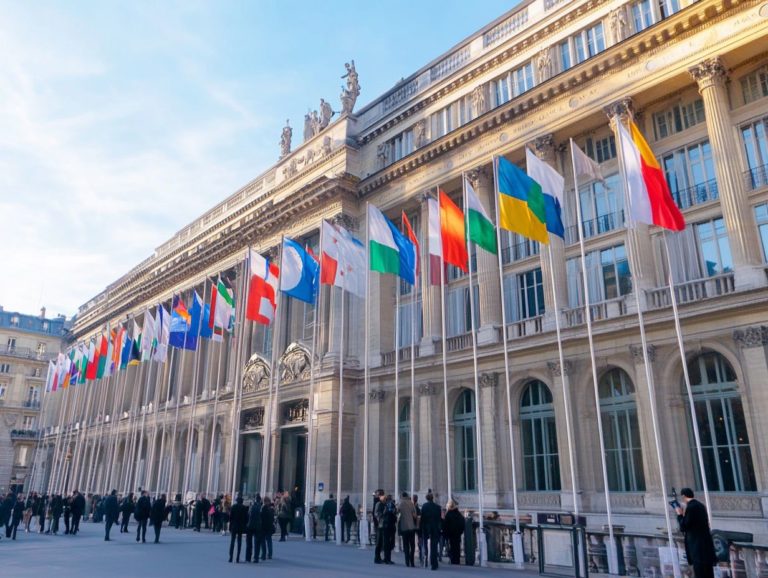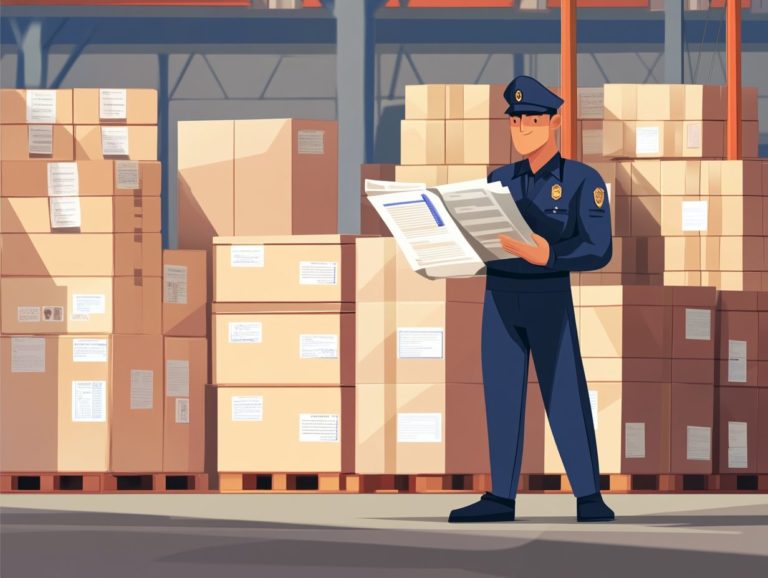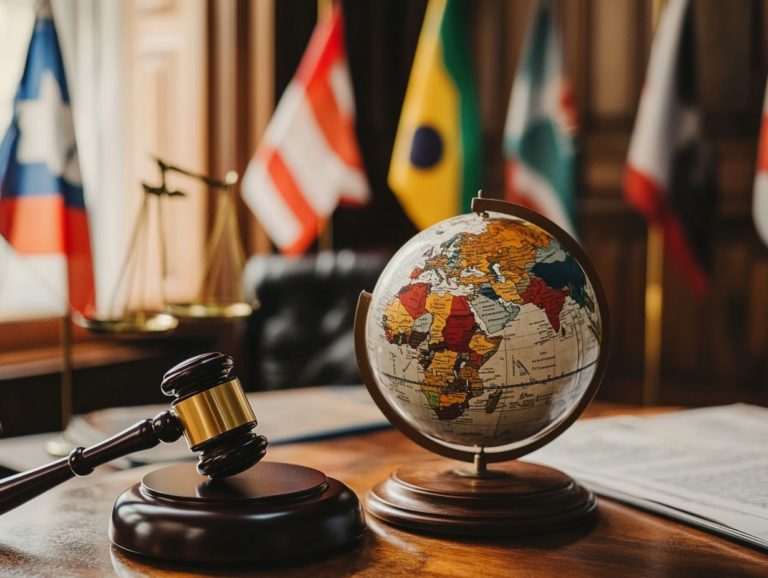The Future of International IP Law
In today s increasingly interconnected world, International Intellectual Property (IP) Law plays a crucial role in shaping how your ideas and creativity are protected around the world.
This article delves into its evolution, tracing significant historical milestones that have laid the groundwork for the legal frameworks we rely on today. As globalization and rapid technological advancements introduce new challenges, you ll discover the implications for both businesses and individuals.
We ll explore potential solutions and strategies designed to foster fairness and adaptability in this ever-evolving landscape. Join the journey as you navigate the intricacies of IP law and its future impact on society.
Contents
- Key Takeaways:
- What is IP Law?
- The Evolution of International IP Law
- Current Challenges in International IP Law
- The Future of International IP Law
- Implications for Businesses and Individuals
- Possible Solutions and Strategies
- Frequently Asked Questions
- What is the future of international IP law?
- What challenges does international IP law face in the future?
- How will the digital age affect international IP law?
- Will there be greater global cooperation in the future of international IP law?
- How will emerging technologies impact international IP law?
- What can individuals and businesses do to prepare for the future of international IP law?
Key Takeaways:
- The future of international IP law will be shaped by globalization and technological advancements, making it necessary for businesses and individuals to stay informed and adapt accordingly.
- As international IP law evolves, it will continue to affect different stakeholders in various ways, highlighting the need for fair and balanced solutions to address challenges.
- Predictions and potential changes in international IP law point towards increased protection and enforcement measures, while also promoting fairness and balance for all stakeholders involved.

What is IP Law?
Intellectual Property (IP) refers to creations of the mind, like inventions and artistic works. IP Law is a sophisticated framework that provides essential legal protections for innovations, creations, and brands.
By encompassing areas such as copyright law, trademark law, and patent law, it enables you creators and innovators to maintain control over how your work is utilized. It also ensures you garner the recognition and economic rewards you deserve.
As globalization accelerates, the relevance of IP law intensifies in today s fiercely competitive market. It drives compliance policies and safeguards corporate IP rights, nurturing innovation and creativity within the creative industry.
The Evolution of International IP Law
The evolution of International IP Law has been profoundly shaped by global viewpoints and the valuable contributions of organizations like the World Intellectual Property Organization (WIPO), particularly in understanding the interplay between trade law and IP law.
Over the years, IP law has adapted to meet new challenges and technological advancements that continuously redefine the intellectual property landscape. This ongoing change is vital to keeping protections effective.
Historical Context and Key Milestones
Key milestones weave a tapestry in the historical context of IP law, including the establishment of copyright law, trademark law, and patent law. Together, these elements form the bedrock of legal protection for intellectual property.
WIPO has been instrumental in developing these frameworks. It fosters international collaboration and sets standards that safeguard creative rights across borders.
Significant treaties like the Berne Convention and the Paris Convention have emerged, paving the way for uniform protection of creative works and inventions. These agreements are crucial in promoting trust and collaboration among stakeholders in the creative industries.
WIPO’s influence extends well beyond treaties. Its commitment to providing resources and training has solidified its role in shaping a predictable and robust legal landscape. It also offers dispute resolution mechanisms.
As digital platforms burgeon, the demand for comprehensive IP protections intensifies. This compels traditional legislation to adapt and embrace new forms of creativity and innovation.
Current Challenges in International IP Law

In today’s fast-paced landscape, you encounter a myriad of challenges within international IP law, largely fueled by globalization and technological advancements, including the role of social media.
As digital platforms expand and artificial intelligence becomes increasingly prominent, the intensity of IP litigation has surged. This shift underscores the necessity for comprehensive compliance policies designed to tackle these emerging challenges and safeguard intellectual property rights in our digital era.
Stay informed about these changing laws to protect your creative work!
Explore further the dynamic world of International IP Law and its implications for society today.
Globalization and Technological Advancements
Globalization and technological advancements have profoundly reshaped the intellectual property (IP) landscape, presenting both opportunities and challenges, especially at the intersection of IP law and human rights, in enforcing legal rights that protect creators’ work.
As you venture into new markets, the importance of intellectual property becomes clearer, requiring a good understanding of various legal frameworks to navigate these complexities.
The interconnectedness of economies means that intellectual property laws often need to align with international standards, which can lead to conflicts between local regulations and global practices.
New forms of intellectual property are emerging in this dynamic environment, particularly on digital platforms, where technological innovations continually challenge traditional notions of ownership.
For you, whether as an individual or a business, embracing these changes is essential, especially given the risks of infringement and the accompanying penalties.
This changing landscape directly impacts your profits and shapes your competitive advantage in an increasingly crowded market, ultimately influencing broader economic growth.
The Future of International IP Law
The future of international IP law is on the brink of transformation, influenced by the impact of digital technology on international IP law and insightful predictions designed to meet the evolving needs of stakeholders across various sectors.
As knowledge transfer and innovation drive economic growth, you are likely to see a growing demand for legal frameworks that can quickly adapt to technological advancements, ensuring strong protection of intellectual property rights in our ever-changing digital landscape.
Predictions and Potential Changes
Predictions about the evolution of international IP law suggest that significant changes in compliance policies and legal strategies are on the way, all aimed at addressing technological measures and protecting intellectual property in a fast-paced environment.
As technology advances rapidly, the legal framework you depend on must evolve to include innovative tools and methods that challenge traditional concepts of copyright, trademark, and patent protections.
Stakeholders in creative industries whether you’re an artist, a tech company, or a content creator may find yourselves navigating updated regulations designed not just to protect your work, but also to encourage innovation.
In this shifting environment, the legal profession needs to reassess its role. You should focus on developing strong compliance frameworks that can adapt to these changes while ensuring a fair balance between the rights of creators and users.
Implications for Businesses and Individuals

The implications of international IP law resonate deeply with both businesses and individuals, influencing a broad array of stakeholders within the creative industry and beyond.
As legal frameworks continue to evolve, understanding the importance of intellectual property is not just advantageous but essential. This understanding is crucial for complying with competition law and promoting fair market practices, ensuring that you navigate these complexities with confidence and skill.
How International IP Law Affects Different Stakeholders
International IP law significantly impacts various stakeholders, including businesses, legal professionals, and policymakers, each requiring specialized advice to navigate the complexities of intellectual property and its broader implications.
As a business leader, grasping the nuances of international IP law is crucial for protecting your innovations and maintaining a competitive edge in the global marketplace.
Legal professionals must also keep pace with evolving regulations to provide sound advice and effectively represent their clients.
Meanwhile, policymakers face the intricate challenge of designing frameworks that balance safeguarding intellectual property with promoting innovation and access to information.
This complex landscape demands flexible, context-specific legal solutions that address the diverse needs and objectives of all parties involved, fostering a collaborative approach to managing intellectual property.
Stay ahead by familiarizing yourself with the latest developments in IP law today!
Possible Solutions and Strategies
Understanding the challenges of international IP law requires adopting innovative solutions. These strategies not only promote fairness but also meet the urgent needs of stakeholders seeking effective legal protections, as highlighted in the role of international organizations in IP law.
Embracing such approaches is essential for tackling current challenges and ensuring that the legal framework remains responsive.
Addressing Challenges and Promoting Fairness
To address challenges in international IP law while promoting fairness, focus on effective legal solutions and compliance policies that cater to diverse stakeholders.
These solutions range from developing equitable licensing practices to ensuring transparent dispute resolution mechanisms. Fostering collaboration among creators, businesses, and policymakers is vital for understanding the unique challenges faced by each group.
Engaging in open dialogues and sharing best practices helps tackle emerging issues related to digital technology and intellectual property. This multi-faceted approach enhances compliance and builds trust and resilience within the global IP framework, leading to a fairer legal landscape.
Frequently Asked Questions

What is the future of international IP law?
The future of international IP law is rapidly changing due to technological advancements and globalization. Key trends include increased cooperation among countries, the growing significance of intellectual property rights in global trade, and the influence of emerging technologies like AI on international IP law and blockchain.
What challenges does international IP law face in the future?
One significant challenge is balancing innovation promotion with protecting creators’ rights while considering consumer needs. Other issues include counterfeiting, piracy, cross-border enforcement complexities, and adapting to a constantly evolving technological landscape.
How will the digital age affect international IP law?
The digital age has profoundly impacted international IP law and will continue to do so. With the rise of digital platforms, protecting intellectual property rights has become more complex. To navigate this landscape, it’s important to understand global trends in IP law and address data privacy and ownership issues related to IP rights in the digital realm.
Will there be greater global cooperation in the future of international IP law?
Yes, there is an increasing trend towards global cooperation in international IP law. This is evident in the growing number of international agreements and treaties, along with initiatives by organizations like the World Intellectual Property Organization (WIPO) promoting harmonization and cooperation.
How will emerging technologies impact international IP law?
Emerging technologies such as artificial intelligence, blockchain, and 3D printing will significantly influence international IP law. These developments raise new challenges regarding copyright, patent, and trademark laws, necessitating careful adaptation by policymakers and legal systems worldwide.
What can individuals and businesses do to prepare for the future of international IP law?
Individuals and businesses should stay informed about developments in international IP law, particularly in their specific industries. Regularly reviewing and updating intellectual property protection strategies is crucial, as is seeking legal advice when needed. Implementing ethical practices concerning intellectual property can help mitigate potential future issues.






